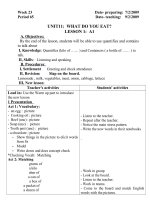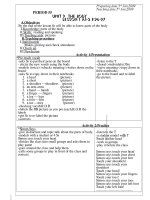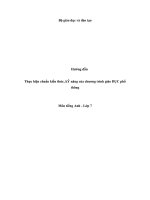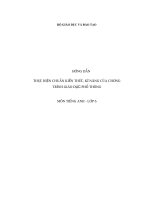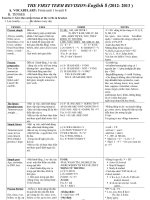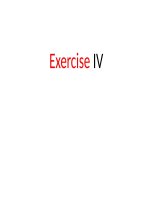on tap ky i 1213 ngoại ngữ 8 hoàng thị mai thanh thư viện giáo dục tỉnh quảng trị
Bạn đang xem bản rút gọn của tài liệu. Xem và tải ngay bản đầy đủ của tài liệu tại đây (211.76 KB, 13 trang )
<span class='text_page_counter'>(1)</span><div class='page_container' data-page=1>
<i><b> THE FIRST TERM REVISION</b></i>
<i><b>-English 8 (</b></i>
<b>2012- 2013 )</b>
<b>A.</b>
<b>VOCABULARY: </b>From unit 1 to unit 8
B. TENSES
<b>Exercise 1: Give the correct tense of the verbs in bracket.</b>
1. Lan (wash)... the dishes every day
<b>TENSES</b> <b>USES</b> <b>FORM</b> <b>NOTES</b>
<b>Present simple</b>
Always, usually,
Often, never,
Sometimes, ever
Every, seldom
Once/twice/three
times.. a
week /month…
Diễn tả
-Một chân lý,một sự thật hiển
nhiên,1 thói quen ở hiện tại.
-Một hành động trong tương
lai ở mệnh đề trạng ngữ chỉ
thời gian bắt đầu bằng: when,
before, after ,until ,till,As soon
as,…
-lịch trình ,thời gian biểu
TO BE: AM, AM NOTà I
IS ,ISN’T à HE, SHE, IT, BA
ARE, AREN’Tà WE, YOU, THEY
ĐỘNG TỪ THƯỜNG
I, WE, YOU, THEY HE, SHE, IT, BA
(+) S + V S + V+ S/ ES
(-) S+ DON’T + V S+ DOESN’T + V
(?) DO + S+ V? DOES +S + V?
-Yes, S+ do /does
-No, S+ don’t /doesn’t
-V+ ES: :động từ tận cùng có: O, S, Z,
X, SH, CH
Go->goes mix->mixes havềhas
study-> studies (tận cùng có phụ âm +
ies )≠ PLAYS
-Cách đọc đuôi ES/ S
Những động từ tận cùng có:
*s,sh,ch,z,x,ge,ce,se+(e)s=>/IZ/
*p, t, k, f, à /s/; helps,looks
*các âm còn lạià/z/: loves, plays,
learns
<b>Present </b>
<b>progressive</b>
Now,at the
moment,at
present,sau câu
mệnh
lệnh-Look!/
Listen!/ Be
careful!..
Diễn tả 1 hành động ,1 sự việc:
- đang xãy ra lúc nói hay trong
khoảng thời gian đang nói..
-Một hành động tạm thời
-Một hành động được sắp xếp
trong tương lai với trạng từ chỉ
thời gian: tonight, tomorrow,
next week.
(+) S+ IS/AM/ARE + V-ING
(-) S+ IS/AM/ARE + NOT + V-ING
(?) IS/AM/ARE+ S + V-ING?
YES..S+IS/AM/ARE
NO..S +IS/AM/ARE+NOT
-Livềliving
-swimàswimming(tận cùng có 1
ngun âm + 1 phụ âmàgấp đôi phụ
âm + ING
-BeginàBeginning # visità Visiting
- Các động từ khơng chia ở thì hiện tại
tiếp diễnàthì hiện tại đơn:be, want,
like, see, belong, know, love, need,
hate ,suppose, remember, release,
mean, forget, prefer, hear, believe,
seem,
understand, have, think..những động
từ có ý niệm thơì gian
ngắn:stop,drop,find,buy,break,..
<b>The future </b>
<b>intention tense</b>
Tomorrow,next
,tonight….
-Một sự việc ,một hành động
được sắp xếp trong tương lai.
-Dựa vào hiện tượng để dự báo
điều sắp xảy ra.
-Một sự việc sẽ được thực hiện
mà được quyết định trước khi
nói.
(+) S+ IS /AM /ARE /+ GOING TO+V
-)S+IS/AM/ARE+NOT+GOINGTO+V
(?) IS /AM / ARE+S +GOING TO +V?
Yes. S+ IS /AM /ARE.
No.S + IS /AM /ARE/+NOT
-Những động từ chỉ sự chuyển động:
go ,come ,move..dùng thì hiện tại tiếp
diễn thay cho tương lai gần
Ví dụ:
I’m going to my village tomorrow.
<b>Simple future</b>
Tomorrow,next
,soon.,in two
years time,in
2012,I think,I
promise, I hope.
-Một sự việc ,một hành động
chắc chắn hoặc không chắc
chắn sẽ xảy ra trong tương lai.
-Một lời hứa ,1 quyết tâm,1 lời
đe doạ
-Trong câu đề nghị yêu cầu
lịch sự.
-Một sự việc sẽ được thực hiện
mà được quyết định ngay lúc
nói.
(+) S+WILL/SHALL+V
(-) S+WON’T/SHAN’T+V
(?) WILL/SHALL +S +V?
Yes. S+WILL/SHALL
N o. S+WON’T/SHAN’T
-I will = I’ll
-will not = won’t
-shall not = shan’t
* I , WE -à SHALL
* Shall we + V? = Let’s + V
* Shall I +V ? = Do you want me
to +V?
<b>Simple past</b>
Ago, yesterday,
in 2005, last..
-Một hành động ,1 sự việc xảy
ra tại một thời điểm xác định
trong quá khứ
- 1 chuổi hành động xảy ra
trong q khứ theo trình tự
thời gian
- 1 thói quen trong quá khứ
-Dùng trong câu tường thuật ,
Và kể chuyện
<b>TO BE: </b>
-WAS, WASN’Tà I, HE,SHE,IT,Ba
-WERE,WEREN’Tà WE,YOU,THEY
<b>*ĐỘNG TỪ THƯỜNG</b>
(+) S+V-ED/II
(-) S+ DIDN’T+V
(?) DID + S +V?
<b>-Trả lời: </b>
Yes, S + did
No, S + didn’t
- Động từ quy tắc: V + ED
Arrive à Arrived
Stop à Stopped
Study à studied
- Cách đọc đuôi “ED”/id/ à t, d:
visited, needed…
/t/ à s, k, p, f, sh, ch, θ (th) ,dz:
looked, missed…
/d/ à các âm còn lại: loved,
called….
<b>Present Perfect</b>
(for, since, ever,
before, so far, up
to now, until
- Diễn tả 1 hành động bắt đầu
từ quá khứ kéo dài đến hiện
tại/ tương lai: for, since, ever,
before, so far, up to now, until
now…
- Khẳng định:
S + have/ has + PP
<b>- Phủ định:</b>
S + have/ has + not + PP
*PP: V-ed / V3
* I, we, you, they à have
He, she, it à has
* Been/ gone.
</div>
<span class='text_page_counter'>(2)</span><div class='page_container' data-page=2>
2. Nam (just/ meet) ...his English friend
3. Where is John ? He (read) ...a book in his room
4. We (finish) ...our meal half an hour ago
5. My borther (not/ write) ...to me for months
6. How many times you (be)... to England ?
7. This is the first time he (drive)... a car.
8. You (see)... my book ? I (lose ) ...it
9. I (study) ...English since I (be) ...11 years old
10. He often (come) ...home at 5 p.m, but today he (not/ come) ...home yet
11. My mother (visit)...me next weekend
12. I like your car. How long you (have) ...it ?
13. Mai (buy)... a new shirt last week, but she (not/ wear)... it
14. Alexander Graham Bell (introduce)... the telephone in 1876
15. what you (do)... next summer vacation ?
16. My brother usually (go)... to work early to avoid traffic jams
17. I (not eat)... anything for two days.
18. They (move)... to HCM city in 1990 and (live)... there since then
19. Helen (feel)... very well yesterday, but today she (feel)... sick again
20. What are you doing tonight ? I (go)... to the circus
21. The sky is very dark, I think it... (rain)
22. I (not invite)... Richart yet
23. Five minutes after we (arrive)... at the beach, it (start)... to rain
24. We should go home, It (get)... darker and darker
25. I (try)... to get hold of you for minutes. Where have you been ?
26. The letter I (receive)... yesterdav is on the desk
27. This film is the best one I ...(ever see)
28. She always (remember)... the names of the people that she... (meet)
29. What you (do)... now ? I (learn)... English
30. I (not see)... him since he (leave)... this school
31. I usually read the newspaper while I .. for the bus
32. Phuong (not finish)... her home work yet
33. You should practice (speak)... English veryday
34. Wel (already finish)... our homework
35. We (have)... a party next Sunday would you like ...(come)
<b> C. STRUCTURES</b>
<b> 1</b><i><b>. S+V+ (not ) adj + enough + to –infinitive</b></i> : (Khơng) đủ……..để làm gì
<i> <b>S+ V(not ) adj + enough (for someone ) + to –infinitive</b></i>
<i> Example :a- My sister is old . She can drive a car . -> My sister is old enough to drive a car .</i>
b)Mr.Nam is not rich . He can’t buy a house . -> Mr.Nam is not rich enough to buy a house
c)The weather was fine . We could go camping . -> The weather was fine enough for us to go camping
<i> .<b> 2. S+ V + too + adj (for someone ) + to –infinitive : </b></i>qua…..không thể….
Example : My mother is too tired to cook dinner .
a-I’m busy . I can’t go to the movie theater . <sub></sub>I’m too busy to go to the movie theater
b-This bag is heavy . I can’t carry this bag . <sub></sub>This bag is too heavy for me to carry .
c- The question is difficult .We can’t answer the question . <sub></sub> The question is too difficult for us to answer .
<b>Exercise 2 :</b>
1. The weather was beautiful. We can go camping. - >The weather was_____________________________________
2. Huy wasn’t hard-working. He couldn’t get good grades. -> Huy wasn’t___________________________________
3. He can touch the light because he is very tall. - >He is ________________________________________________
4. The porter couldn’t carry this heavy suitcase because he was weak.- > The porter was _______________________
5. The question is difficult. We can’t answer it.- >The question is _________________________________________
6. He is tall. He can play volleyball - > ...
7. The weather was fine. We could go camping. - >...
8. Mr Minh isn't rich. He can't buy a car. - >. ...
9. Peter is too young to see the honor film - > - Peter isn't ...
10. My brother is weak. He can't lift this table - > - My brother isn't ...
11. I can't drive a car because I am only 16 years old - > I am not ...
<b>3. Used to –infinitive :</b> đã từng (thói quen trong quá khứ ) ≠ be /get used to + V-ING
* Affirmative form (Thể khẳng định ) : S + used to-infinitive
</div>
<span class='text_page_counter'>(3)</span><div class='page_container' data-page=3>
Example :I used to go swimming but now I don’t go swimming any more .
<b>EXERCISE 3 . Rewrite the following sentences, using used to .</b>“ ”
1. I gave up smoking ten years ago. - > ...
2. he doesn’t play tennis as well as he used to. - > ...
3. Nam no longer comes late for class . - > ...
4. I lived in London once, but I don’t any more. - > ...
5. We had a lot of friends when we lived in the countryside.- > ...
6. We usually lit our houses with candles. - > ...
7. Books were usually written by hand. - > ...
8. He often went fishing when he was young. - > ...
<b>4.Modals</b> : must , have to , ought to , will , can ,could + v (infinitive )
Example : I can play soccer .
<b>5.Gerunds</b> ( Danh động từ:) like , enjoy , love , dislike , hate + V-ing
-be interested in, be good at , look forward to… …
Example : I like watching TV .
She doesn’t like playing volleyball .
<b>6.Reported speech : </b>
<b>* Command & request : </b> @ - S +told someone ( not ) to –infinitive
Example :She said : “Don’t play soccer in the street ,boys .”
->She told the boys not to play soccer in the street .
-Nam said to me : “please wait for me a few minutes .”
->Nam told me to wait for him a few minutes .
@ - S + asked someone ( not ) to –infinitive
Tuan said to Nam : “Can you lend me your history book .”
->Tuan asked Nam to lend him his history book .
<b>*Advice: </b>S + said (to + O )+ S+ should + V (infinitive )
Lan said to Nam : “you should change the way you learn English .”
->Lan said Nam should change the way he learned English .
<b>Exercise 6</b> : <b>Put the following sentences into reported speech </b>
1. “Could you buy me an English book , Hoa ?” Nam asked Hoa .->Nam asked………
2. “Please turn off the radio .” Phuong said to Tuan .- > Phuong told………
3. “Can you get back home by half past ten ?” Minh said to his sister . -> Minh asked………
4. “Please remind Lan to practice speaking English ,Mrs.Hau” Lan’s teacher said
Lan’s teacher asked …..……….
5. “Get up early to learn your lesson ,Toan” His father said .-> His father told Toan ………
6. “You should stay in bed for a few days .” The doctor said to Hoa .
The doctor said Hoa………
7. “You shouldn’t drink wine or smoke .” The doctor said to Nam - > The doctor said ………
8.Their mother said to them: “Don’t make so much noise .” - >Their mother told them ………
9.Nam said to the taxi driver : “please turn lelt at the first traffic light .”
Nam asked ……….
10.”Your brother shouldn’t watch action movies, they are very violent.”said Ba.
Ba advised...
11.The man said: “don’t swim out too far, boys” ………
12.The doctor said: “You should take a few days off.” ………
13.The teacher said to Lan: “You mustn’t leave your books on the table.”………
14.The policeman said to me: “Move your car, please.” ………
15.My mother said to my brother: “You should go to bed early.” ………
16.The woman said: “Don’t play in this area,children .” ………
17.The doctor said: “ You should not eat fatty food .” ………
18.The policeman said to my sister: “Move your car, please.” ………
19. Lan said “ Please give Tim this dictionary .”………
20. Tuấn said “ please give me this book .”………
<b>7. Reflexive pronouns </b> (đạit từ phản thân )
I -> myself
You -> yourself /yourselves
They -> themselves
He -> himself
She -> herself
It -> itself
</div>
<span class='text_page_counter'>(4)</span><div class='page_container' data-page=4>
2.You will cut yourself /yourselves with that knife if you are not careful .
3.I must learn to control myself .
<b>8/ Prepositions of time (giới từ chỉ thời gian):</b>
- IN (trong, vào): Thế kỉ, năm, tháng, mùa, các buổi trong ngày (trừ at night)
- ON (vào): Các ngày trong tuần, ngày tháng, ngày cụ thể (on christmas day; on my birthday)
- AT (lúc, vào lúc): giờ, ban đêm, và những dịp lễ (at christmas)
- AFTER (sau, sau khi) BEFORE (trước, trước khi)
- BETWEEN (giữa hai khoảng thời gian, ngày, năm …)
<b>EXERCISE 8:Prepositions:</b> (điền giới từ thích hợp vào chỗ trống )
1.She was born in the USA ………1928 . 9.We moved here ………20th<sub> May .</sub>
2.She is proud ……….her son . 10.Please turn……….the light for me .It’s too dark.
3.We arranged to meet you ……seven ….the morning . 11.They came to visit me………my birthday .
4.The post office is not far ……….. my house. 12.She was born ……..May 4th<sub> , 1990 …….Dalat.</sub>
5-He worked …….deaf – mutes …. Boston University. 13.Mrs. Lien said you could reach her …. 340450458
6.Snow is falling all ………….. the country. 14.Will you pick me ………….. after the party?
7.The secretary took a message ………. her boss. 15.What do you usually do …………. the weekend.
8.They often go out for dinner ______Saturday evenings.
<b>9. Comparison</b> with like : tương tự như , như là
Example : He sings like a singer .
Minh is like his brother .
-Ngoài ra cịn có thể sử dụng : the same as , similar to
+ different from : khác với
My old school is different from my new school .
+So sánh bằng -S1+ V+ as +adj /adv +as + S2
+So sánh không bằng : -S1+ V+ not so /as +adj /adv +as + S2
+ So sánh hơn / so sánh nhất
ADJ/ ADV COMPARATIVE SUPERLATIVE
Short S1+v+adj/adv+ ER+than + S2 S + v + the +adj/adv+ EST( N)
long S1+v+ MORE+adj/adv+than + S2 S + v + the MOST +adj/adv( N)
Hot -> hotter -> the hottest much/ many -> more -> the most Easy -> easier -> the easiest
far -> further-> the furthest Good / well -> better -> the best
</div>
<span class='text_page_counter'>(5)</span><div class='page_container' data-page=5>
<i><b>I. Choose the best answer to complete these sentences </b></i>
1. I ______ a letter from my old friend last week. (sent / gave / received / took)
2. We must be there ______ 7.30 and 10.30. (at / before / between / after)
4. She has ______ over 30 pages since yesterday. (written / wrote / write / writing)
5. I find Peter is not communicative. He’s rather ______ in public. (kind / reserved /sociable / humorous)
6. My farther used ______ us to the park three years ago. (took / taking / to take / take)
7. The increase in ______ has led to overcrowding in many cities. (vehicles / houses / population / streets)
8. Can you fill ______ this form for me? (out / on / at / to)
9. “Would you ______ to go to the movies with me?” “I’d love to” (like / want / love / mind)
10. Deaf-mute can ______ speak ______ hear. (both .. and/not only … but also/neither … nor/either … or)
11. When I was a child, I ______ follow my mum to the market. (used to / liked / hated / loved)
12. His parents are always proud ______ him. (about / of / on / with)
13. ______ have you lived in this town? – For nearly 20 years. (When / Where / How far /How long)
14. The new shopping mall is quite ______ the present shopping area. (different from / the same / like to / similar)
15. They have studied ______ six o’clock. (for / at / since / to)
16. “____________?” – “It’s 20.000 dong” (How much is this parcel cost / How much does this parcel take / How
much does this parcel / How much does this parcel cost)
17. I ______ the country life ______ the city life. (like – than / prefer – to / like – to / prefer – than)
18. They have studied ______ six o’clock. (for / at / since / to)
19. He does morning exercises regularly in order to ______ his health. (have / improve / get / take)
20. Don’t let your child ______ with matches. (playing / to play / plays / play)
21. They ______ from Canada to America to find work. (started / demonstrated / delivered / migrated)
22. Last night I watched the movie Romeo and Juliet. At last they killed ______ . (together / each other / themselves /
one another)
23. My mother is ______ tired ______ cook tonight. (enough – to / too – to / so – that / very – to)
24. He went to school late because he was stuck in the ______ this morning.(rush-hour / traffic-light / traffic-jam /
cross-road)
25. Airmail is ______ expensive than surface mail. (the most / most / much / more)
26. The increase in ______ has led to overcrowding in many cities. (vehicles / houses / population / streets)
27. She is studying hard ______ pass the final exams.(for / in order to / so to / so that)
28. John came ______ an old school friend in the street this morning. (with / along / across / off)
29. She asked her children ______ (to stop playing / stop to play / stop playing / stopping to play)
30. He is not ______ ride a motorbike. (enough old to / enough old for / old enough to / old enough for)
31. I don’t talk much in public. I am rather (kind / sociable / reserved / humorous)
32. (Novel / Fiction / Folktale / Legend) is a story passed on in spoken form from one generation to the next.
33. You must look in the (advertisement / recreation / diversion / participation) section of the newspaper to find out what
films are showing.
34. During rush-hours, (traffic lights / crossroads / traffic-jams) often happen.
35. (Would / Could / Do / Will) you like to go to the movies? – I’d love to.
36. Deaf-mutes can (both speak and hear / not only speak but also hear / neither speak nor hear / either speak or hear)
37. They have waited for her (for / since / at / from) 6 o’clock.
38. This neighborhood is (different / the same / as / like) from that one.
39. What does she look like? (She look beautiful / She looks beautiful / She looks like beautiful)
40. The calendar is (on / under / behind / in) the clock.
41. Minh and I didn’t enjoy (myself / ourselves / himself / themselves) at the party.
42. When my father was young, he used to (singing / sang / sings / sing) very well.
43. I like (think / thinking / to think) carefully before (make / making / to make) a decision.
44. You should work (hardly / hard / good / badly) in order to pass the exams.
45. It is too dark (to take / take / taking / took) photographs here.
46. Jim is not old enough (read / reading / to read) this book.
47. Could you do me a favor? (What can I do for you / Thanks a lot / It’s very kind of you / No, thank you. I’m fine)
48. I (haven’t met / don’t meet / didn’t meet / won’t) him yet.
49. The doctor advised him (go / to go / going / goes) to bed earlier.
50. They got married and lived (happy / happily / happiness)
<b>II. Correct the mistakes in the sentences</b>:<b> </b>
</div>
<span class='text_page_counter'>(6)</span><div class='page_container' data-page=6>
2. Her bag is different to mine. ……….
3. The meeting will be held in April 2nd<sub>. </sub> <sub>……….</sub>
4. She speaks English quite good. ……….
5. They didn’t reported a book last week ……….
6. I have not seen him for last Sunday. ……….
7. She has went to the mountain. ……….
8. She has black long hair. ……….
9. She ought to staying in bed. ……….
10. She is as tall so her sister. ……….
11. We have attended this course since two weeks. ……….
12. He drives very careful. ……….
13. Our father used to smoking when he was young. ……….
14. She studies English so as to going abroad. ……….
15. He has hair short dark. ……….
16. He said that he is a doctor. ……….
17. She asked me keep silent. ……….
18. There are many differently ways of learning words ………...
19. They are interested in do something different at weekend. ………
20. My book is the same of yours. ……….
<b>III. Rewrite the following sentences:</b>
1. Ba likes visiting his grandmother on this weekend. - > Ba enjoys ...
2.I often went fishing on the weekend when I lived on the farm .
I used ...
3. Jane is a skillful swimmer. - >Jane
4. Lan learns English very well. - > Lan is _____________________________
5. Tom is a good soccer player. - > Tom plays _______________________________
6. Loan is a good swimmer. - > Loan ___________________________________
7. Hung run very fast. - > Hung is ______________________________________
8. Plays are not as interesting as films. - > Films are ______
9. English isn’t as difficult as French. - > French is ______________________________
10. Jill is more intelligent than Bill. - > Bill isn’t _______________________________________
11. Nga doesn’t speak English as well as Trang - > Trang speaks ___________________________
12. Mrs. Thanh drives more carefully than Mrs. Hong.
Mrs. Hong doesn’t ___________________________________________
13. We started to learn English three years ago. - > We have ...
14. My father began working for that company in 2005 - > My father has ...
15. The last time I saw him was in 1985 - > I haven’t ...
16. Are you and Jane the same age ? - > Are you as ...
17. Noone in the group is younger than Joanna. - > Joanna is ...
18. They bought that house in 1976. - > They have ...
<b>IV.Complete the following sentences with the correct form of the words in brackets</b> ;
1.What led to the……….of the telephone ? (INVENT )
2.Tuan ………his friends to his house on Christmas Day . (INVITATION )
3.Your dictionary is………..from mine . (DIFFERENCE )
4.My mother cooked a………dish last night . (TASTE )
5.Everyone in the neiborhood is………..with what we have done .(PLEASE )
6.Mary likes attending the English……….contests . (SPEAK )
7. “Ao dai” is a………dress of vietnamese women . (TRADITION )
8.This school doesn’t have any sports ……….. (EQUIP )
9.The ………..of the house is very kind to us . ( OWN )
10.I’ll make………..for you to meet him at the airport . (ARRANGE )
11. ………, dark clouds appeared and it began to rain. ( FORTUNATE)
12. His ………makes him successful in his business ( wise)
13. Parents must pay much attention to the ...of their children ( safe)
</div>
<span class='text_page_counter'>(7)</span><div class='page_container' data-page=7>
<b>READING COMPREHENSION</b>
<i><b>I. Complete the following passage with the words given in the box.</b></i>
<b>1</b>.
</div>
<span class='text_page_counter'>(8)</span><div class='page_container' data-page=8>
Many (1) _____________ believe that life on the farm is very quiet and easy, but (2) ____________ is very hard. I
myself have (3) ____________ on a farm for nearly twenty years and I know what farm work (4) _____________. You
must get up early, (5) _____________ the chickens and the cows, water the flowers, vegetables, do (6) _____________
of gardening and then (7) ____________ in the fields. But my aunt likes this way of life and (8) ______________ do all
her children.
<b>2</b>.
</div>
<span class='text_page_counter'>(9)</span><div class='page_container' data-page=9>
Dear Mai,
I’m having a lovely time here in Kim Lien. It’s a (1) _________________ village. I’m staying at my uncle’s house. I
have a nice view of the paddy field from my bedroom. Things are changing (2) _______________ the countryside.
People can now have things (3) ________________ refrigerators and televisions. Medical (4) _______________ are
more accessible. Today I’m going for a long (5) ______________ by the lake. The air is clean and people are very (6)
______________. Would you like to come here next (7) ______________ holiday? I hope you’ll (8) ______________ it.
<b>3</b>.
</div>
<span class='text_page_counter'>(10)</span><div class='page_container' data-page=10>
A customer (1) ______________ the Thang Loi Delivery (2) _____________ on June 16 just after midday. The
customer’s (3) _____________was Mr. Nam, and he wanted to (4) ______________ to Mrs. Van. Mrs. Van was (5)
______________ meeting and could not come to the phone. So Mr. Toan took a (6) ______________. Mr. Nam called
about his (7) _____________ order. He said Mrs. Van could (8) _____________ him at 8 634 082.
4.
</div>
<span class='text_page_counter'>(11)</span><div class='page_container' data-page=11>
(1) ______ in Scotland in 1847, Alexander Bell became interested very early in methods of (2) ______ communication.
He (3) _____ influenced by his father and grandfather, who spent years working with (4) ______ people and those with
faulty speech. Bell’s father even go so far as to (5) ______ a system of so-called “visible speech” for the deaf. He used
sketches of the different (6) ______ of the lips and tongue. This science of visible speech (7) ______ the foundation of
young Bell’s knowledge of the mechanics of human (8) _____.
<i><b>II. Read the following texts. Then answer the True / False sentences </b></i>
<b>1/ </b>Hello! My name’s Ba. I’m 13 years old. I have a close friend, Lan. She is 15, but she isn’t as tall as I am. Every day I
go to school in the morning, my sister has classes in the afternoon. Like Lan, I love pop music, reading my novels in my
free time. We both like playing chess and going swimming in the summer. Unlike Lan, I don’t like cooking, doing the
shopping on Sundays. Instead, I like watching films, especially war films on T.V. I also love playing soccer in my spare
time.
1. Both Ba and Lan go to school in the morning. ____
2. They love pop music, reading novels. ____
3. They don’t like playing chess and going swimming in Summer. ____
4. Lan doesn’t like cooking, doing the shopping on Sundays. ____
5. Ba likes watching war films on T.V. ____
6. Lan also loves playing soccer in her free time. ____
<b>2/ </b> Lily comes from China . She’s a university student. She’s eighteen years old. She is studying English as a foreign
language. English is important to her because she will need it for her job in the future. She began learning English when
she was very young – at the age of eight. She thinks that her biggest problem is listening. People speak very quickly, so
she can’t understand them. English is really hard for her to learn, but she likes it. She wants to be an English teacher; or
hopes to become a singer one day because she loves English songs very much
1. English is important to Lily as she will need it for her future job. ____
2. She started learning English when she was eighteen. ____
3. She has a problem with listening. ____
4. She can understand people when they speak fast. ____
5. She doesn’t find English difficult to learn. ____
6. She loves English songs but she doesn’t want to become a singer. ____
<b>3/ </b>Graham Bell was born in Scotland in 1478, but when he was a young man of twenty-three he moved with his parents
to Canada. Before the year was over, young Graham left his family and went to Boston. Though Bell was a dreamer, he
was also a practical thinker and a man of action. In Boston, where he worked by day as a teacher of the deaf, he worked
far into night experimenting with the electrical transmission of the sound. This led to the invention of the telephone.
1. Alexandra Graham Bell was born in England. ____
2. He immigrated to Canada in 1865 ____
3. He went to Boston when he was twenty-three. ____
4. Graham Bell worked with the deaf in Boston. ____
5. He experimented with the electrical transmission of the sound by day. ____
6. Graham bell invented the telephone. ____
<b>III. </b><i><b>Read the following passages. Then answer the questions</b></i>
<b>1/</b> Do you have any close friends? I think everybody at least has one close friend in their life. And so do I. I have two
close friends, Hanh and Mai. We are in the same class at the primary school, and then secondary school. We are also
neighbors so we spend most of our time learning and playing together. Hanh is a beautiful girl with big black eyes and
an oval rosy face. She is an intelligent student who is always at the top of the class. She likes reading, and she often goes
to the library whenever she has free time. Mai isn’t as beautiful as Hanh, but she has a lovely smile and looks very
healthy. Mai is very sporty. She spends most of her time playing sports. Mai is a volleyball star of our school. She is
also very sociable and has a good sense of humor. Her jokes always make us laugh. I love both of my friends and I
always hope our friendship will never die.
<b> Questions </b>
a. What does Hanh look like?
b. What does she like?
c. What does she often do in her free time?
d. Is Mai more beautiful than Hanh?
e What is Mai’s hobby?
f. Which sports does Mai play in the school team?
</div>
<span class='text_page_counter'>(12)</span><div class='page_container' data-page=12>
“… In the first year of lower secondary school I had some difficult in learning English. My pronunciation of
English words was really bad and my English grammar was worse. I did not how to improve them. One afternoon after
the lesson, my teacher of English told me to wait for her outside the classroom. She took me to the school library and
showed me cassettes of pronunciation drills kept in a glass bookcase. She also told me how to use an English–English
dictionary to improve my English grammar. “Now I think you know what you should do”, said she. I made much
progress and only one year later I won the first prize in the English Speaking Contest held for secondary school students
in my hometown.”
<b> Questions </b>
a. What difficulties did Nam have in learning English in the first year?
b. Who wanted to meet him one afternoon after the lesson?
c. Where did they go after that?
d. What did the teacher show him then?
e. What did she tell him to improve his English grammar?
f. What did he win one year later?
<b>3/ </b>
Lan is excited about the interesting activities she is going to do.
The Y & Y is having a plan to help the community. She will participate in its recycling program. In joining this
program, she will collect glass, used paper and empty cans. Then she will send them for recycling.
She hopes she can save natural resources and raise some money for the school Y & Y in these activities. She also
thinks about participating in either planting trees and flowers or helping the street children. It is really interesting, isn’t
it?
<b> Questions </b>
1. Is Lan going to have interesting activities?
2. What is the Y & Y planning to do?
3. What will she do?
4. Will she send them for recycling?
5. What does she hope in these activities?
6. Does she think about helping the street children?
<b>4/ </b>
<b>VII. Choose the word that has the underlined part pronounced differently from the others. </b>
1A. generous B. reserve C. festival D. message
2A. escape B. equipment C. excited D. emigrate
3A. appear B. annoy C. agree D. after
4. A.hoped B.raised C.died D.appeared
5A. graze B. magical C. grandmother D. rag
6A. match B. catch C. watch D. math
7A. rug B. cushion C. cupboard D. rule
8A. knife B. wife C. nice D. children
9A. happy B. try C. candy D. electricity
10A. character B. architect C. chair D. chemical
11. A. pancake B. surface C. paper D. late
12. A. wanted B. played C. learned D. returned
13. A. saucepan B. precaution C. caught D. laugh
14. A. answer B. always C. wrong D. write
15. A. injure B. knife C. kill D. sink
16. A. fun B. lunch C. run D. humor
17. A. mend B. semester C. letter D. report
18. A. shout B. loud C. group D. about
19. A. promise B.revise C. stick D. visit
20A. match B. pan C. transmit D. safety
21A. equipment B. upset C. end D. help
<b> VIII.Rewrite</b>
</div>
<span class='text_page_counter'>(13)</span><div class='page_container' data-page=13>
5.Tom started learning English in 2008 . ->Tom has……….
6.Helping poor children is a good activity .- >It is……….
7. What about going to the beach now ? - Yes, let’s.
Shall………..………?
8. Mary is taller than Daisy. Daisy isn’t ………
9. Our teacher said, “ Listen carefully in class to save your study time at home. “
Our teacher told ………
10. Do you need any help ? - > May ………?
11. He said me, “ Open the door and the window” ………..…
12. He said me, “ Don’t drink coffee, please”………..…
13. "Eat more fruits and vegetables" , the doctor said to her
The doctor told her...
14. “Can you wait for me here, Jerry?”.Tom told Jerry...
15. A dog is bigger than a cat. A cat isn’t as...
16. “Can you speak more slowly ?” he said to me.-> He asked...
17. I often went boating when I was young. -> I used to...
18. The teacher said :” Don't talk in class, students”
-> The teacher asked the students ………
19- Hoa’s bag is 50,000 dong. Lan’s bag is 70,000 dong
-> Hoa’s bag is not as………..
20. My mother said to me: “ Turn down the television, please.”
-> My mother asked me ………...
21. Miss Jackson said: “ Can you give Tim this dictionary?”
-> Miss Jackson asked ...
22. Ba intends to visit his friend next Sunday. -> Ba is ...
23. Do you want to leave her a message? -> Would you ...?
24. When I was young, I often go fishing on the weekend. -> I
</div>
<!--links-->

